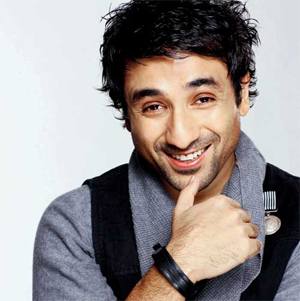 Vir Das certainly is a triple threat: a stand-up comic, a musician, and of course an actor, and now he can add zombie fighter to his list! In his upcoming film Go Goa Gone he has to battle zombies in India’s first Zom-com. Directed by the fab and cool duo Raj and DK, Go Goa Gone is a buddy/slacker film that mixes horror, comedy, action, and so much more! From the very first look, fans have been clamoring to see Zombies Indian style and they will get to see them in all their gory (sorry, could not resist) when the film hits theaters on May 10th. I got the chance to chat with Vir and we had a fabulous, fun, and as you can expect at times, very funny conversation on acting, Go Goa Gone, and what else he has coming up! Enjoy!!
Vir Das certainly is a triple threat: a stand-up comic, a musician, and of course an actor, and now he can add zombie fighter to his list! In his upcoming film Go Goa Gone he has to battle zombies in India’s first Zom-com. Directed by the fab and cool duo Raj and DK, Go Goa Gone is a buddy/slacker film that mixes horror, comedy, action, and so much more! From the very first look, fans have been clamoring to see Zombies Indian style and they will get to see them in all their gory (sorry, could not resist) when the film hits theaters on May 10th. I got the chance to chat with Vir and we had a fabulous, fun, and as you can expect at times, very funny conversation on acting, Go Goa Gone, and what else he has coming up! Enjoy!!
How and when did you know you wanted to be a comedian and an actor?
You know, I knew I wanted to be an actor first. That is what a lot of people don’t know and don’t realize is that I actually used to do a lot of high school and college drama. Then I actually went to the US to study theater and ended up doing a Bachelor’s in theater. So the intention was always to be an actor. However, after four years of really serious acting training I was kind of sick of it because I did a lot of Shakespeare, Chekov, Miller and Simon. I was looking for an art form that was a little more organic and a little more improvised so then I started doing stand-up comedy. I wrote my first stand-up comedy special when I was like 22 and that kind of took off for me so I never really got back into acting until I was 28. For six years I worked full time at a news channel doing my own sort of news comedy show and touring as a comic. Then I saw Rang De Basanti with Aamir Khan and I sort of sat back and said, okay now the kind of cinema that I want to do is being made. That is when I gave up my job at a news channel and really took up film full time.
From Shakespeare and Chekov to comedy that is quite a big leap. I am just intrigued on how you made that transition…
I am fortunate that I am a really observational comic. I don’t really write about politics or religion or race, I write about really small things. So I kind of made that transition when I graduated from college and I was a dishwasher in Chicago in 2003. I was broke and I wasn’t able to pay rent and girls weren’t talking to me… because women can smell a broke man from miles away, and I was juggling five jobs, and kind of I ended up writing about that shit in my life. The transition was more like a venting process and it became a very cathartic thing for me to talk about how sucky life was on stage and that kind of grew into finding my own voice as a comedian and a comedic style. I think the first six months were jokes about being broke and not getting laid… pretty much.
So then to your journey to Bollywood actor, I know you did some other films and then the huge hit of Delhi Belly…
Yes, Namastey London, Love Aaj Kal and a bunch of films. I used to sort of keep ducking out when I was working at that news channel and say let me do a day in this film and let me do a week in that film. When I saw Rang De Basanti for the first time I said okay I want to quit my job and I want to pursue being a lead or at least playing a major role in Hindi cinema. So I quit my job in maybe January and by June I had signed Delhi Belly and Badmaash Company. I knew those were gateways to making it to lead actor. That is what Delhi Belly did for me. It was that last sort of booster shot that I needed to go from character actor to lead.
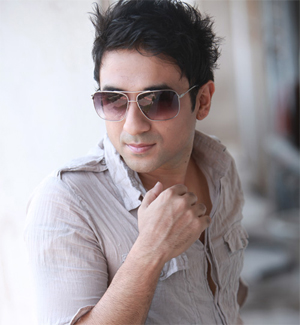 Delhi Belly was such a huge success and I think that took everybody a little bit by surprise because it was such a different movie for Hindi cinema. Did it surprise you?
Delhi Belly was such a huge success and I think that took everybody a little bit by surprise because it was such a different movie for Hindi cinema. Did it surprise you?
Yes and no. We had this sense on set, when we were making Delhi Belly , that everybody in the film knew that we will only make this film once in our lifetime. That spirit was there from everybody from the caterers to the actors to everyone. We all sort of comprised, took pay cuts, worked 20 hour shifts and did what we needed to do because we knew that this was not going to be a normal thing, it was something special. Post Delhi Belly, when it hit and it became this monster phenomenon that it was, that is when I signed seven films. Starting with Go Goa Gone I am going to be seen in a release every two months pretty much in a leading space, but I have been still seeking out that experience. That same sense on set that this is the film we know we may never make again. That is kind of what I have been actively seeking for in scripts as well.
Getting to Go Goa Gone, what made you say yes to this film?
After Delhi Belly, I had this particular situation that suddenly in two months I got like 35-40 scripts. All of them were lead roles and I thought this is my chance to go lead and there is this nice kind of new age, comedy leading man space that doesn’t exist right now and I want to be able to fill that gap. I don’t want to do another Delhi Belly and I was offered like six other Delhi Bellys and I kind of said okay what have I not done? I said I have not done a really commercial love story and I find a film called Sooper Se Ooper with Reliance, which is a boy who goes to Rajasthan and falls in love, which is me and Kirti Kulhari. I said I have never really done an urban kind of rom-com like in a Harry Met Sally Dharma space so I signed this film Amit Sahni Ki List. It is actually with 10 girls and it is this guy who has OCD on the look out for love, it’s nice and it is in a funny space. I have never done a kids film, so I signed a nice kids family film Golu Pappu, which is with me and Kunal Roy Kapoor from Delhi Belly.
Then I was looking for my fourth film and I said okay I am going to steer clear of that Delhi Belly young humor zone unless it is really, really, really something special. Then Raj (Nidimoru) called me in for a meeting and we had this really weird/odd meeting where he looked at my face and I looked at his face for five minutes and we said nothing and then we both left. And then after that I would see Raj and (Krishna) DK at all of my stand-up comedy shows, they came and saw my band, saw the History of India, saw my improv troupe so I kind of knew a script was coming… Then when I got it and read it I was like okay this is young and it is sort of in that same zone as Delhi Belly in terms of humor and casting but it’s Zombies and it is India’s first. I liked it so much I postponed the shooting of all my other three films that I had already signed and shot this one first. That is how good the script was. Then I went on to sign three more films, which are very interesting as well. (Tigmanshu Dhulia’s Revolver Rani, Santa Aur Banta, Shaadi Ke Side Effects).
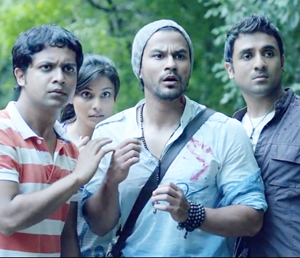 Go Goa Gone is a horror zombie movie and it is a comedy, so how was it to work on India’s first zom-com?
Go Goa Gone is a horror zombie movie and it is a comedy, so how was it to work on India’s first zom-com?
What I really liked was that I usually get to play the really high-energy, funny guy with the funny lines and in this one I am playing the mellow, slow paced pothead who doesn’t really give a tight shit about much. What I also really liked about this film was that confusion was kind of the main tool for humor, where here are three guys who are essentially stoners and slackers, just real idiots who have never seen a zombie before, don’t know what a zombie is and for damn sure don’t know how to kill it! And that is kind of the audience as well; the audience has never seen a zombie film before in India. The audience is just as confused as we are and so as we learn, the audience learns as well. I thought that was a really cool comedic tool. That is what I really liked about it.
Tell us about working with the directors.
Raj and DK are fantastic, they really are. I think if they were the opposite sex they would be a married couple – they just compliment each other and they finish each other’s sentences and there is never really any conflict between the two. They are technically fabulous as well and you know, horror movies really allow for a lot of technical play. If you are really interested in shot-taking and makeup and the GC side of cinema, then horror is really the genre to do. It was just really good fun. The film was an entire unit of people that were under 30 years old and shot in Goa and in Mauritius so we just partied for two months, that is really all we did.
And just made a film on the side…
Yeah, yeah (Laughs)
What was the hardest thing about making this movie?
Just the elements. You know there is no sets there is no studio. We shot on the hillside, in the jungles and in the sea, so at any point we are either running, shooting, jumping, climbing, falling or swimming, so that was really tough. So yes, it was a comedy but what a lot of people don’t realise is there is a heavy amount of action in this film as well! There are guns and explosions and zombies and stabbings and killings and all of that stuff. So shooting for all that was really tough. I really enjoy it – I do my own stunts, every single one, in Delhi Belly as well, but that is always tough.
I know you are an actor and you can play scared but is it hard to be scared of a zombie? Because that is something that you have not experienced so is that hard to play?
Yes, it is hard to play, especially if it is a super hot girl who arrived in a bikini that morning and then they make her into a really scary looking zombie. (Laughs) If you have seen the hot version of her before in the morning it is not easy to be scared but you do it…you know what I am saying?
I read that you and your band Alien Chutney have done a song for the film.
We are! We are doing a promotional song for the film, it’s cool.
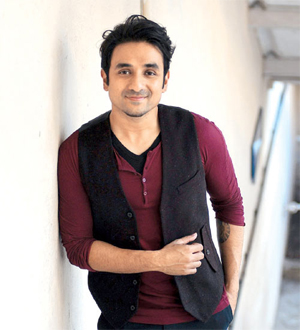 What do you think of the other music in the film?
What do you think of the other music in the film?
It’s great. I like music that is very contextual to the film. I don’t like it when it could be like, a zombie comedy, but if there is romance suddenly you are in the mountains… So what I like about this is we have a song called ‘Slowly Slowly’ because all these zombies are created all really slowly. This movie begins on a Monday morning so we have a Monday song called ‘Khoon Choos Le’, because zombies like to suck blood. We have a song called ‘Babaji ki Booti’, which is about being a pothead. So it’s very contextual and relevant, the songs feel almost a part of the screenplay.
Now the reaction to the trailer was amazing, which was surprising a little bit because it is the first type of film like this…
It got a million hits in 2 days! That audience is so specific and decisive about what they want: the audience that makes something go viral. They have so many options available to them, they are watching 10 new trailers a week and so they are very decisive. I view that as a huge vote of confidence. I am very optimistic because I know the best parts of the film are not in the trailer. I am excited because if you liked the trailer there is much better stuff yet to come in the film.
What excites you about being an actor?
It’s really is a different part of the brain working and I like that. Stand-up comedy is very high adrenaline and it is over in an hour and a half. It is all about broad topics and changing very, very fast. But film is about the minutest detail. It takes eight months and it is about being extraordinarily patient and doing the same thing over and over again. It’s like a different side of my brain and it is a different way to find funny. I am in this very interesting predicament where typically an actor has one audience, but I have three audiences. I have a music audience, a comedy audience and a film audience and all the audience consumes all of my content so the expectations are very high. The pressure is very high. I am always searching for innovative ways to be funny and film really provides that. Like in Badmaash Company, it was I am a very urban guy and I have never played sort of a roadside cheek Romeo and that is a good way to be funny. In Delhi Belly, what was really exciting to me was the fact that I had no voice for the second half of the film. I had no lines and no voice so the idea was can I not speak and still get the laugh, that was what was interesting to me. And in this, Go Goa Gone, can I be sort of mellow and not be high energy and still get the laughs as well? So film gives you the opportunity to do that. Stand-up is about jokes and using the same tools but in film you change your tool kit now and then.
Now do you use your experiences on set now in your comedy?
I do. I figure there will come a day when I want to end my Bollywood career and then I am going to write this 90-minute show and say everything I have been waiting to say secretly.(Laughs) I am not going to do that this year, I hope to be around for many, many years. (Laughs)
Looking back over your career so far what would you say?
It’s weird because I like to think of myself as an outsider who worked myself inside every industry. I am not fully accepted in films because I am a comedian. I am not fully accepted in comedy because I am a film actor. I am not full accepted in rock music because I do comedy and film. But at the same time I am being able to work in all the industries with the studios, large audiences and best musicians and that’s kind of cool. I like to think of myself as having snuck my way into many, many rooms (laughs) that maybe I didn’t belong there. And that has been fun.
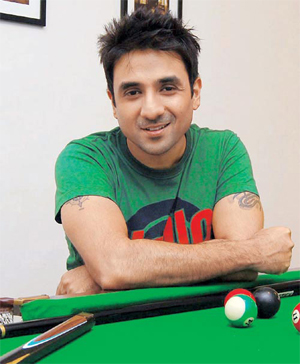 What do you think of Hindi cinema today?
What do you think of Hindi cinema today?
I think it is in this wonderful space where if you are super smart about your economics you can literally make any film you like, on any subject, with any cast. That is something that happened to American cinema and British cinema a very long time ago and that gave birth to people like Adam Sandler, Ben Stiller and Jim Carrey who grew up to be 20 million dollar stars. We are in that space right now where if you are really smart about your economics these high concept comedy, high concept horrors, high concept romances really, really, really work. It is only when you cross spending 25 crore on your film then you need to make a certain formula film. It is just this really cool time to be in Bollywood where you’ll see new kinds of leading men and new kinds of heroines and new kinds of scripts. It is tremendously exciting!
What can audiences expect when they come see Go Goa Gone?
First, I think they can expect zombies in an Indian context. We are not trying to be cool, we are not trying to be macho, we are not trying to be edgy, we are just trying to be Indian and that has never been done before. The film is very honest in that sense where it is really an Indian take on the horror genre. Second thing is that it is very much still a buddy comedy, it is a slacker movie. There is a very cool friendship between me and Kunal Khemu at the center of that film and we have got good chemistry. You know even in Delhi Belly it was the chemistry between the three boys that carried that film and I like to believe that the chemistry is there again in Go Goa Gone. As I said that sense that nobody has ever done this before really, really, really brings about good improvisation and camaraderie between the three boys and that is true here. It was fun. And it is Saif, as you have never seen Saif Ali Khan before!
Go Goa Gone will hit theaters on May 10th!









